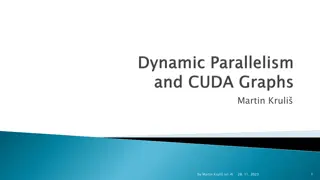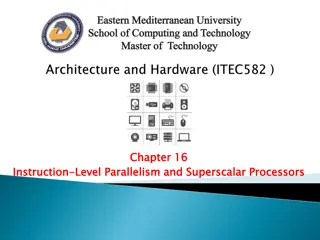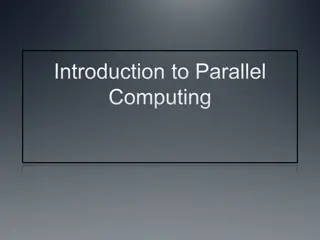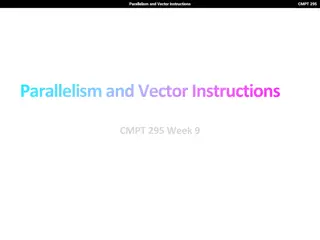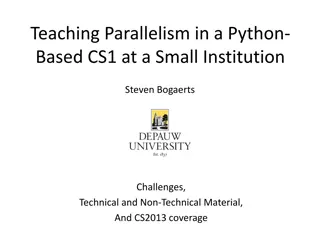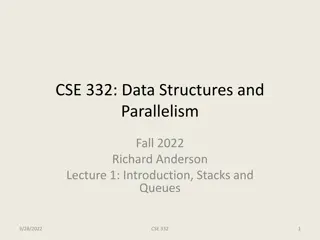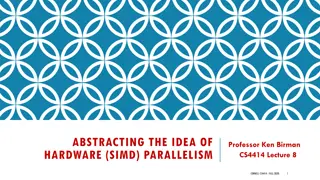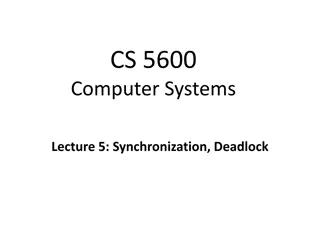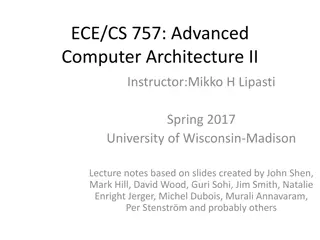Understanding Atomics and Parallelism in Programming
Explore the world of atomics, parallelism, memory access optimizations, and sequential consistency in programming. Dive into concepts such as races in multithreading, cache optimizations, and the importance of memory access order before and after compiler optimizations. Witness live demos showcasing matrix summing optimization and learn about core atomic operations. Gain insights into how access can be considered in terms of interleaving statements from different threads, and understand examples of sequential consistency with store buffers and variable values.
Download Presentation

Please find below an Image/Link to download the presentation.
The content on the website is provided AS IS for your information and personal use only. It may not be sold, licensed, or shared on other websites without obtaining consent from the author. Download presentation by click this link. If you encounter any issues during the download, it is possible that the publisher has removed the file from their server.
E N D
Presentation Transcript
Atomics Variables: Not radioactive, but you probably still don t want to touch them! Roy Margalit
Races Prior To Atomics Accessing the same memory location from 2 threads where one of them writes is undefined behavior Undefined behavior Cache Optimizations
Cache RAM Cache Cache CPU 2 CPU 1
Optimization (Single Thread) for (int i=0; i<ROWS; ++i) for (int j=0; j<COLS; ++j) c[i][j] = a[i][j] + b[i][j]; for (int j=0; j<COLS; ++j) for (int i=0; i<ROWS; ++i) c[i][j] = a[i][j] + b[i][j];
Lets see a live demo Matrix summing with optimization from previous slide Watch for sentinel value ?1,1 ??,1 ?1,? ??,? ?1,1 ??,1 ?1,? ??,? ?1,1 ??,1 ?1,? ??,? = + Wait for value to change
Memory Access Order Before compiler optimizations 1 2 3 After compiler optimizations 3 2 1
core.atomic To The Rescue Defined behavior for race Sequential Consistency atomicLoad(foo); atomicStore(foo);
Sequential Consistency (SC) Access Can be considered in terms of interleaving the statements from various threads.
Sequential Consistency Example (Store-Buffer) x = 0; y = 0; x = 1; a = y; y = 1; b = x; x, y are global variables; a, b are local
Sequential Consistency Example Variable x y a b Value 0 0 0 0 x = 1; a = y; y = 1; b = x; x, y are global variables; a, b are local
Sequential Consistency Example Variable x y a b Value 1 0 0 0 x = 1; a = y; y = 1; b = x; x, y are global variables; a, b are local
Sequential Consistency Example Variable x y a b Value 1 0 0 0 x = 1; a = y; y = 1; b = x; x, y are global variables; a, b are local
Sequential Consistency Example Variable x y a b Value 1 1 0 0 x = 1; a = y; y = 1; b = x; x, y are global variables; a, b are local
Sequential Consistency Example Variable x y a b Value 1 1 0 1 x = 1; a = y; y = 1; b = x; x, y are global variables; a, b are local
Sequential Consistency Example Variable x y a b Value 0 0 0 0 x = 1; a = y; y = 1; b = x; x, y are global variables; a, b are local
Sequential Consistency Example Variable x y a b Value 1 0 0 0 x = 1; a = y; y = 1; b = x; x, y are global variables; a, b are local
Sequential Consistency Example Variable x y a b Value 1 1 0 0 x = 1; a = y; y = 1; b = x; x, y are global variables; a, b are local
Sequential Consistency Example Variable x y a b Value 1 1 1 0 x = 1; a = y; y = 1; b = x; x, y are global variables; a, b are local
Sequential Consistency Example Variable x y a b Value 1 1 1 1 x = 1; a = y; y = 1; b = x; x, y are global variables; a, b are local
Sequential Consistency Example a 0 0 1 1 b 0 1 0 1 Possible? No Yes Yes Yes x = 0; y = 0; x = 1; a = y; y = 1; b = x; x, y are global variables; a, b are local
Lost Performance SC forces cache flushes SC prevents reordering of statements
C++ Memory Model Weaker memory access that is cheaper Races are still defined Price to pay: Less synchronization
Relaxed Cheapest atomic No synchronization Monotonic (Total order over writes to x) Can be reordered between different variables x = 0; x = 1; x = 2; a = x; assert(x >= a);
Release / Acquire Synchronizes threads. Things before the release happened before the acquire. x = 0; y = 0; x = 1; y = 1; a = y; // 1 b = x; // 1
Store Buffer x = 0; y = 0; x = 1; a = y; y = 1; b = x; a = 0 && b = 0 ?? Live Demo
Testing Is Not Enough Testing on one architecture (x86) will not show issues with others (Power-PC, ARM). X86-TSO gives more guarantees than even Release/Acquire.
Message-Passing x = 0; y = 0; x = 1; y = 1; a = y; b = x; a == 1 && b == 0 ?? Live Demo
A Short Story: Petersons algorithm in C++ In 1981, Peterson proposed a simple algorithm for critical section in shared memory. It assumes sequential consistent shared memory (SC). CPU CPU CPU Memory W x 0 W y 0 Q: How to implement Peterson s algorithm in C/C++11? W x 1 W y 1 R y 0 R x 0
A Short Story: Petersons algorithm in C++ C++ atomics and memory ordering, blog post by Bartosz Milewski https://bartoszmilewski.com/2008/12/01/c-atomics-and-memory-ordering/
A Short Story: Petersons algorithm in C++ A subsequent post by Anthony Williams analyzed both algorithms: Bartosz s implementation is indeed wrong. Dmitriy s implementation is correct. https://www.justsoftwaresolutions.co.uk/threading/petersons_lock_with_C+ +0x_atomics.html "Any time you deviate from SC, you increase the complexity of the problem by orders of magnitude."
Fast forward to 2020 A solution in the future?
How does my research try to solve this problem?
Verification Verifying programs under weak memory models (WMM) is difficult We d like to verify programs assuming SC: verification under weak memory verification under sequential consistency = + ??? Robustness: ???? ??= ???? ???
Goal verification under weak memory verification under sequential consistency = + robustness Robustness: ???? ??= ???? ??? Automatically establish robustness of programs against WMM Our focus is on C/C++11 memory model: ???? ??= ???? ?11
How does the C++ model describe behaviors? W x 0 W y 0 x = 0; y = 0; x = 1; y = 1; a = y; b = x; W x 1 R y 1 W y 1 R x 0
Example: message-passing litmus test a = y b = x a = y b = x x = 1 y = 1 a = y b = x y = 1 b = x a = 0 b = 0 a = 0 b = 0 a = 1 b = 0 a = 0 b = 0 a = 1 b = 0 W x 0 W y 0 W x 0 W y 0 W x 0 W y 0 W x 0 W y 0 W x 0 W y 0 W x 1 R y 1 W x 1 W x 1 R y 1 W x 1 W y 1 R x 0 W y 1 W y 1 Wx1 T1 Wy1 T1 Ry1 T2 Rx0 T2 (?0,?0) (?3,?3) (?1,?1) (?2,?2) (?4,?4) ?11 ?11 ?11 ?11 Initial state final state
?,?.(?0,?0) ?11 (?,?) ? is SC consistent SC-consistent W x 0 W y 0 Linearization: W x 1 R y 1 Init: W x 0 W y 0 T1: W x 1 W y 1 W y 1 T2: R y 1 W x 0 W y 0 SC-inconsistent W x 1 R y 1 W y 1 R x 0
Robustness against C11 is decidable and PSPACE-complete. Reduction toreachability under an instrumented SC semantics Proof idea: a minimal robustness violation: SC-consistent SC-inconsistent (?0,?0) ?11(?1,?1) ?11(?2,?2) ?11 ?11(??,??) ?11(??+1,??+1) Can take a C11-step to a non-SC execution graph ,?1) ??(?2 ?1 ,?2) ?? ?? (??,??) ?2 (?0,?0) ?? (?1 ?0 Robustness information ??
x = 1 y = 1 y = 1 b = x a = y b = x a = y b = x b = x y = 1 a = 0 b = 0 a = 1 b = 0 a = 0 b = 0 a = 0 b = 0 a = 1 b = 0 W x 0 W y 0 W x 0 W y 0 W x 0 W y 0 W x 0 W y 0 W x 0 W y 0 W x 1 W x 1 W x 1 R y 1 W x 1 R y 1 W y 1 R x 0 W y 1 W y 1 Wx1 T1 Wy1 T1 Ry1 T2 Rx0 T2 (?0,?0) (?3,?3) (?1,?1) (?4,?4) (?2,?2) ?11 ?11 ?11 ?11 ,?1) ?1 ,?2) ?2 robustness violation! (?0,?0) ?0 (?3,?3) ?3 (?1 (?2 ?? ?? ?? In C11, T2 may not read from Wx1, but in SC it must.
Rocker A static automated tool for checking robustness of simple programs. Robustness is verified under SC
Results (Release/Acquire) Program Robustness Time (seconds) Peterson (SC) 1.0 Peterson (Bratosz) 1.1 Peterson (Dmitriy) 1.2 Store-Buffer 0.9 Message-Passing 0.9
Results (Relaxed) Program Robustness Time (seconds) Peterson (Dmitriy) 1.2 Peterson (Fix1) 1.3 Peterson (Fix2) 1.3 Store-Buffer 0.9 Message-Passing 0.9
Robustness against C11 is decidable and PSPACE-complete. robust verification problem assuming SC input program with C11-like atomics and non-atomics SPIN model checker Rocker not robust You can try the tool without having to understand the memory model! Rocker https://github.com/rymrg/rocker/ Thank you!


